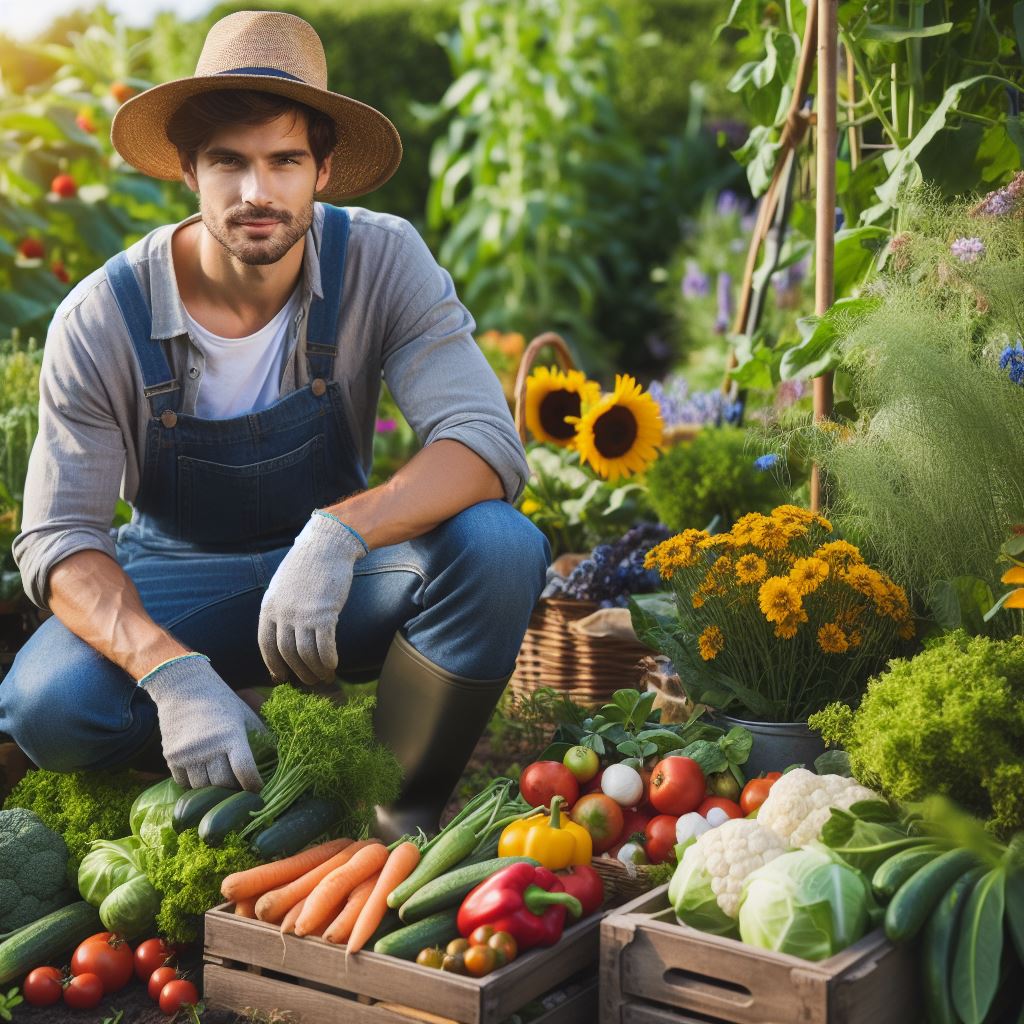Introduction
Sustainable agriculture plays a crucial role in ensuring food security and environmental sustainability.
Eco-farming is an approach that promotes organic practices and reduces the use of synthetic inputs.
Sustainable agriculture is significant as it helps protect the environment and provides socio-economic benefits to society.
Welcome to “Eco-Farm Basics: Sustainable Agriculture 101,” your comprehensive guide to the principles and practices that define sustainable farming.
In this enlightening exploration, we delve into the core concepts of eco-friendly agriculture, unveiling the intricate web of methods aimed at fostering environmental harmony, preserving resources, and ensuring a resilient future for our planet.
Join us on a journey through the fundamental principles, innovative techniques, and transformative approaches that lay the foundation for sustainable farming.
Whether you’re a seasoned farmer or a curious enthusiast, this guide promises to deepen your understanding and inspire a commitment to cultivating the land with ecological responsibility.
Let’s sow the seeds of a sustainable agricultural revolution together!
What is Sustainable Agriculture?
Definition of sustainable agriculture
Sustainable agriculture refers to the practice of farming that focuses on long-term environmental and economic stability while producing food.
Key principles of sustainable agriculture
By adopting these key principles, farmers can provide a sustainable and reliable food supply while minimizing negative environmental impacts.
Soil conservation and health
Soil conservation and health are crucial because healthy soil supports plant growth, retains water, and prevents erosion.
By implementing practices such as crop rotation, cover cropping, and organic fertilization, farmers can maintain soil fertility and structure.
Biodiversity preservation
Biodiversity preservation is essential for a resilient and thriving ecosystem.
Farmers can promote biodiversity by planting a variety of crops, creating wildlife habitats, and avoiding the use of genetically modified organisms.
Water management and conservation
Water management is vital as agriculture is a major consumer of fresh water.
Transform Your Agribusiness
Unlock your farm's potential with expert advice tailored to your needs. Get actionable steps that drive real results.
Get StartedFarmers can conserve water by using drip irrigation, precision farming techniques, and rainwater harvesting.
Energy efficiency and renewable resources
Energy efficiency reduces greenhouse gas emissions and dependence on non-renewable energy sources.
Farmers can adopt energy-efficient equipment, use renewable energy systems, and implement energy-saving practices.
Ecological pest management
Ecological pest management reduces reliance on harmful synthetic pesticides.
Farmers can use biological controls, crop rotation, and integrated pest management strategies to minimize pest damage.
Social and economic viability
For sustainable agriculture to be successful, it must also be socially and economically viable.
Farmers need fair prices, access to markets, and support for their communities to ensure the long-term viability of their farming operations.
Sustainable agriculture benefits not only the environment but also the consumers, farmers, and the wider society.
Consumers can enjoy healthier and safer food, while farmers can maintain their livelihoods and contribute to rural development.
In short, sustainable agriculture encompasses practices that prioritize the long-term well-being of the environment, society, and economy.
By following the key principles, farmers can ensure food production while minimizing their ecological footprint and contributing to a sustainable future.
Embracing sustainable agriculture is crucial for a resilient and thriving agricultural sector in the face of environmental challenges and the growing global demand for food.
Through collective efforts, we can pave the way for a more sustainable and resilient future for agriculture and the planet as a whole.
Read: Natural Pest Control: Organic Methods Unveiled
Benefits of Sustainable Agriculture
Sustainable agriculture brings numerous benefits to both the environment and society.
By implementing sustainable farming practices, we can improve the overall health of our ecosystems while addressing the pressing issues surrounding conventional agriculture.
Let’s explore some of the key benefits in detail.
Environmental benefits
- Soil protection and fertility improvement: Sustainable agriculture practices, such as crop rotation and cover cropping, help maintain soil structure, prevent erosion, and enhance nutrient content. This leads to healthier and more productive soils in the long run.
- Reduction of water pollution: Sustainable farmers employ various strategies like precision irrigation and agroforestry to minimize water usage and prevent agricultural runoff from contaminating water sources. This helps protect aquatic ecosystems and ensures clean drinking water.
- Conservation of biodiversity: Sustainable farming methods prioritize the preservation of natural habitats and the protection of wildlife. By avoiding the use of harmful chemicals and promoting ecological diversity, sustainable agriculture helps maintain a healthy balance within ecosystems.
Social benefits
- Improved food quality and safety: Sustainable agriculture focuses on producing organic, pesticide-free, and nutrient-rich food. This results in safer and healthier products for consumers, reducing the risk of food-borne illnesses and improving overall well-being.
- Enhanced rural livelihoods: Sustainable agriculture empowers small-scale farmers by providing them with sustainable income opportunities, improving their financial stability, and revitalizing rural communities. It also encourages the growth of local markets and fosters community relationships.
- Decreased reliance on external inputs: Sustainable farming methods aim to minimize the use of costly external inputs like synthetic fertilizers and pesticides. By adopting practices such as composting, crop rotation, and integrated pest management, farmers become more self-reliant and economically independent.
Economic benefits
- Cost savings from reduced chemical inputs: By reducing dependency on expensive chemical inputs, sustainable agriculture helps farmers save money in the long term. Organic alternatives like compost and natural fertilizers are cost-effective and environmentally friendly alternatives.
- Increased market demand for organic and sustainable products: As consumers become more conscious of their health and environmental impact, the demand for organic and sustainably produced goods is on the rise. This provides sustainable farmers with access to premium markets and better economic opportunities.
In essence, sustainable agriculture offers a holistic approach that benefits the environment, society, and economy.
By implementing practices that prioritize soil health, water conservation, and biodiversity, we can ensure a more sustainable and resilient future for the agricultural sector.
Embracing sustainable farming methods is not only beneficial for farmers but also contributes to the well-being of consumers and the overall health of our planet.
Read: Green Thumbs Up: Secrets of Organic Farming

Sustainable Farming Practices
Organic farming
- Elimination of synthetic chemicals and genetically modified organisms.
- Composting and organic fertilizers.
- Crop rotation and cover cropping.
Organic farming is a sustainable farming practice that promotes the elimination of synthetic chemicals and genetically modified organisms (GMOs).
Farmers who practice organic farming rely on natural methods to control pests and diseases instead of relying on chemical pesticides and herbicides.
This helps to protect the environment and the health of consumers.
Showcase Your Farming Business
Publish your professional farming services profile on our blog for a one-time fee of $200 and reach a dedicated audience of farmers and agribusiness owners.
Publish Your ProfileIn addition, organic farmers use compost and organic fertilizers, such as animal manure and plant matter, to nourish the soil and promote the growth of healthy crops.
Crop rotation and cover cropping are also important practices in organic farming.
By rotating crops and planting cover crops, farmers can break the cycle of pests and diseases, improve soil fertility, and prevent nutrient depletion.
Permaculture
- Design principles for sustainable systems.
- Integration of plants, animals, and natural elements.
- Emphasis on self-sufficiency and resilience.
Permaculture is a farming practice that focuses on designing sustainable systems that mimic natural ecosystems.
It involves the integration of plants, animals, and natural elements to create a self-sustaining and resilient farming environment.
Permaculture design principles include observing and interacting with nature, capturing and storing energy, promoting biodiversity, and using renewable resources.
By applying these principles, farmers can reduce the use of external inputs and create a more sustainable and productive farm.
Agroforestry
- Planting trees alongside crops or livestock.
- Increasing biodiversity and soil fertility.
- Providing additional income opportunities.
Agroforestry is a farming practice that involves planting trees alongside crops or livestock.
This practice has several benefits, including increasing biodiversity and soil fertility.
Trees provide shade, windbreaks, and habitat for beneficial insects and wildlife, while their roots help prevent soil erosion.
Agroforestry also provides additional income opportunities for farmers as trees can be harvested for timber, fruits, nuts, and other products.
By integrating trees into agricultural systems, farmers can improve the sustainability and productivity of their farms.
Conservation tillage
- Reducing soil erosion and degradation.
- Preserve soil structure and moisture content.
- Enhancing carbon sequestration.
Conservation tillage is a farming practice that aims to reduce soil erosion and degradation.
Instead of conventional tillage methods that turn over and disturb the soil, conservation tillage techniques leave the soil undisturbed or minimally disturbed.
This helps to preserve the natural structure of the soil, which improves water infiltration, reduces runoff, and prevents erosion.
By reducing soil erosion and degradation, conservation tillage also helps to improve soil fertility and moisture retention.
Additionally, this practice contributes to carbon sequestration as undisturbed soil can store more carbon dioxide, thus mitigating climate change.
Overall, sustainable farming practices such as organic farming, permaculture, agroforestry, and conservation tillage are essential for promoting a more environmentally friendly and resilient agriculture system.
By adopting these practices, farmers can reduce their reliance on synthetic chemicals, protect the soil and biodiversity, and contribute to climate change mitigation.
Read: Regenerative Agriculture: Healing the Earth
Challenges and Solutions in Sustainable Agriculture
Limited knowledge and awareness
Limited knowledge and awareness pose significant obstacles to the widespread adoption of sustainable agriculture.
However, education and training programs can play a crucial role in enhancing knowledge and raising awareness among farmers.
These programs can provide valuable information about sustainable farming practices and their benefits, encouraging farmers to transition towards more eco-friendly methods.
Additionally, farmer-to-farmer knowledge sharing can facilitate the exchange of best practices and practical insights within the farming community, further promoting sustainable agriculture.
Access to resources and investments
Another challenge faced by farmers is the limited access to resources and investments.
To overcome this hurdle, government support and incentives are crucial. Governments can offer financial aid, subsidies, or grants to farmers who adopt sustainable practices.
This support not only helps farmers access necessary resources but also encourages the transition towards sustainable agriculture.
Collaborative networks and partnerships can also play a significant role in addressing this challenge.
By pooling resources and investments, farmers can collectively overcome financial and resource constraints, promoting sustainability within the agricultural sector.
Market demand and consumer awareness
Market demand and consumer awareness are pivotal in creating a sustainable agriculture market.
Promoting sustainable products through labeling and certifications can help consumers make informed choices.
Clear labels and recognizable certifications can act as indicators of environmentally friendly products, raising consumer awareness and encouraging the demand for sustainable agricultural goods.
Additionally, engaging in direct marketing channels, such as farmers’ markets or community-supported agriculture (CSA), allows farmers to connect directly with consumers, building relationships and educating them about the benefits of sustainable farming.
Policy and regulatory frameworks
Policy and regulatory frameworks also play a critical role in supporting sustainable agriculture.
Advocacy for supportive policies is essential in creating an enabling environment for sustainable farming practices.
Farmers, advocacy groups, and environmental organizations can work together to influence policymakers and shape regulations that prioritize sustainability.
Furthermore, compliance and enforcement mechanisms ensure that these policies are upheld.
Strict enforcement of regulations safeguards against unsustainable practices, encourages responsible farming, and supports the growth of sustainable agriculture.
In a nutshell, sustainable agriculture faces various challenges, but with appropriate solutions in place, these hurdles can be overcome.
By providing education, access to resources, promoting consumer awareness, and advocating for supportive policies, sustainable agriculture can be fostered.
Showcase Your Farming Business
Publish your professional farming services profile on our blog for a one-time fee of $200 and reach a dedicated audience of farmers and agribusiness owners.
Publish Your ProfileIt is crucial for individuals, communities, policymakers, and farmers to collaborate and work towards a more sustainable future in agriculture.
Read: Rainwater Harvesting in Agriculture: A Guide
Conclusion
In this blog post, we have discussed the fundamentals of eco-farm basics and sustainable agriculture.
We have learned about the importance of organic farming methods, the use of renewable resources, and the reduction of chemical inputs.
We have also explored the benefits of biodiversity and ecosystem preservation in sustainable farming practices.
Transitioning towards sustainable farming practices is crucial for the future of our planet.
By adopting eco-friendly techniques, we can reduce environmental pollution, conserve water and soil resources, and promote healthier food production.
Sustainable farming also helps to mitigate climate change and ensure long-term food security.
We encourage all readers to explore and support sustainable agriculture methods.
By purchasing organic produce and supporting local farmers who follow sustainable practices, we can contribute to the growth of a more sustainable food system.
Additionally, we can educate ourselves on sustainable farming techniques and promote awareness among our communities.
Eco-farm basics and sustainable agriculture present a viable solution to many pressing environmental issues related to conventional farming practices.
By implementing sustainable methods, we can create a healthier and more resilient agricultural system that benefits both the environment and human well-being.
Let’s strive towards a sustainable future for ourselves and future generations.




